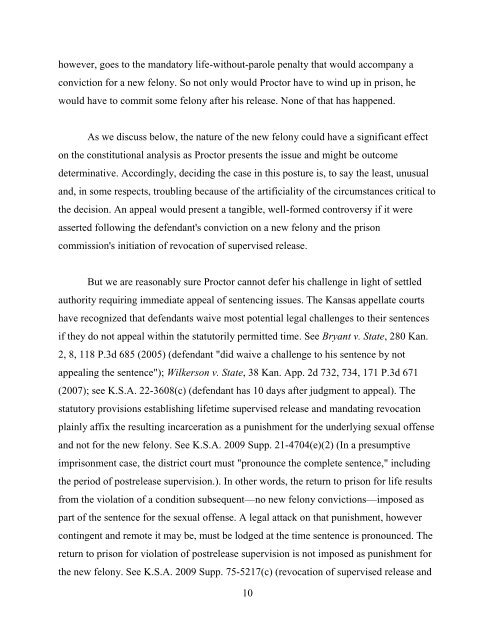State v. Proctor - Kansas Judicial Branch
State v. Proctor - Kansas Judicial Branch
State v. Proctor - Kansas Judicial Branch
You also want an ePaper? Increase the reach of your titles
YUMPU automatically turns print PDFs into web optimized ePapers that Google loves.
however, goes to the mandatory life-without-parole penalty that would accompany a<br />
conviction for a new felony. So not only would <strong>Proctor</strong> have to wind up in prison, he<br />
would have to commit some felony after his release. None of that has happened.<br />
As we discuss below, the nature of the new felony could have a significant effect<br />
on the constitutional analysis as <strong>Proctor</strong> presents the issue and might be outcome<br />
determinative. Accordingly, deciding the case in this posture is, to say the least, unusual<br />
and, in some respects, troubling because of the artificiality of the circumstances critical to<br />
the decision. An appeal would present a tangible, well-formed controversy if it were<br />
asserted following the defendant's conviction on a new felony and the prison<br />
commission's initiation of revocation of supervised release.<br />
But we are reasonably sure <strong>Proctor</strong> cannot defer his challenge in light of settled<br />
authority requiring immediate appeal of sentencing issues. The <strong>Kansas</strong> appellate courts<br />
have recognized that defendants waive most potential legal challenges to their sentences<br />
if they do not appeal within the statutorily permitted time. See Bryant v. <strong>State</strong>, 280 Kan.<br />
2, 8, 118 P.3d 685 (2005) (defendant "did waive a challenge to his sentence by not<br />
appealing the sentence"); Wilkerson v. <strong>State</strong>, 38 Kan. App. 2d 732, 734, 171 P.3d 671<br />
(2007); see K.S.A. 22-3608(c) (defendant has 10 days after judgment to appeal). The<br />
statutory provisions establishing lifetime supervised release and mandating revocation<br />
plainly affix the resulting incarceration as a punishment for the underlying sexual offense<br />
and not for the new felony. See K.S.A. 2009 Supp. 21-4704(e)(2) (In a presumptive<br />
imprisonment case, the district court must "pronounce the complete sentence," including<br />
the period of postrelease supervision.). In other words, the return to prison for life results<br />
from the violation of a condition subsequent—no new felony convictions—imposed as<br />
part of the sentence for the sexual offense. A legal attack on that punishment, however<br />
contingent and remote it may be, must be lodged at the time sentence is pronounced. The<br />
return to prison for violation of postrelease supervision is not imposed as punishment for<br />
the new felony. See K.S.A. 2009 Supp. 75-5217(c) (revocation of supervised release and<br />
10

















